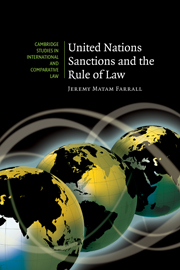Book contents
- Frontmatter
- Contents
- Extended Table of Contents
- Preface
- Abbreviations
- Part I Setting the scene
- Part II The evolution of the UN sanctions framework
- Part III UN sanctions in practice
- 5 Establishing the legal basis for sanctions: identifying threats and invoking Chapter VII
- 6 Delineating the scope of sanctions and identifying targets
- 7 Fine-tuning sanctions: setting objectives, applying time-limits and minimising negative consequences
- 8 Delegating responsibility for sanctions administration and monitoring
- Part IV Strengthening the rule of law
- Appendix 1 Summary of policy recommendations
- Appendix 2 Summaries of UN sanctions regimes
- Appendix 3 Tables
- Bibliography
- Index
- Cambridge Studies in International and Comparative Law
8 - Delegating responsibility for sanctions administration and monitoring
Published online by Cambridge University Press: 26 June 2009
- Frontmatter
- Contents
- Extended Table of Contents
- Preface
- Abbreviations
- Part I Setting the scene
- Part II The evolution of the UN sanctions framework
- Part III UN sanctions in practice
- 5 Establishing the legal basis for sanctions: identifying threats and invoking Chapter VII
- 6 Delineating the scope of sanctions and identifying targets
- 7 Fine-tuning sanctions: setting objectives, applying time-limits and minimising negative consequences
- 8 Delegating responsibility for sanctions administration and monitoring
- Part IV Strengthening the rule of law
- Appendix 1 Summary of policy recommendations
- Appendix 2 Summaries of UN sanctions regimes
- Appendix 3 Tables
- Bibliography
- Index
- Cambridge Studies in International and Comparative Law
Summary
When the Security Council applies sanctions, the primary responsibility for implementing the sanctions falls upon states. In order to ensure that states do in fact implement sanctions, however, the Council has bestowed additional responsibilities for the administration and monitoring of sanctions upon the UN Secretary-General and a range of subsidiary actors. Article 29 of the UN Charter provides that the Security Council may establish ‘such subsidiary organs as it deems necessary for the performance of its functions’. Further authority for the establishment of subsidiary bodies is derived from rule 28 of the Council's provisional rules of procedure, which provides that ‘the Security Council may appoint a commission or committee or a rapporteur for a specified question’. The Security Council has established a number of subsidiary bodies to facilitate the implementation of sanctions, including sanctions committees, disarmament commissions, commissions of inquiry, bodies of experts and monitoring mechanisms. It has also tasked pre-existing UN actors, such as UN peace operations, with responsibilities relating to sanctions implementation.
The Security Council does not always invoke Article 29 or Rule 28 when establishing a subsidiary organ. It has tended to invoke Rule 28 in respect of sanctions committees, but not in respect of bodies of experts or monitoring mechanisms. Practice concerning the establishment of bodies of experts and monitoring mechanisms also varies considerably. Sometimes the Council decides to establish these bodies directly, but at others it requests the UN Secretary-General to establish them.
- Type
- Chapter
- Information
- United Nations Sanctions and the Rule of Law , pp. 146 - 182Publisher: Cambridge University PressPrint publication year: 2007



